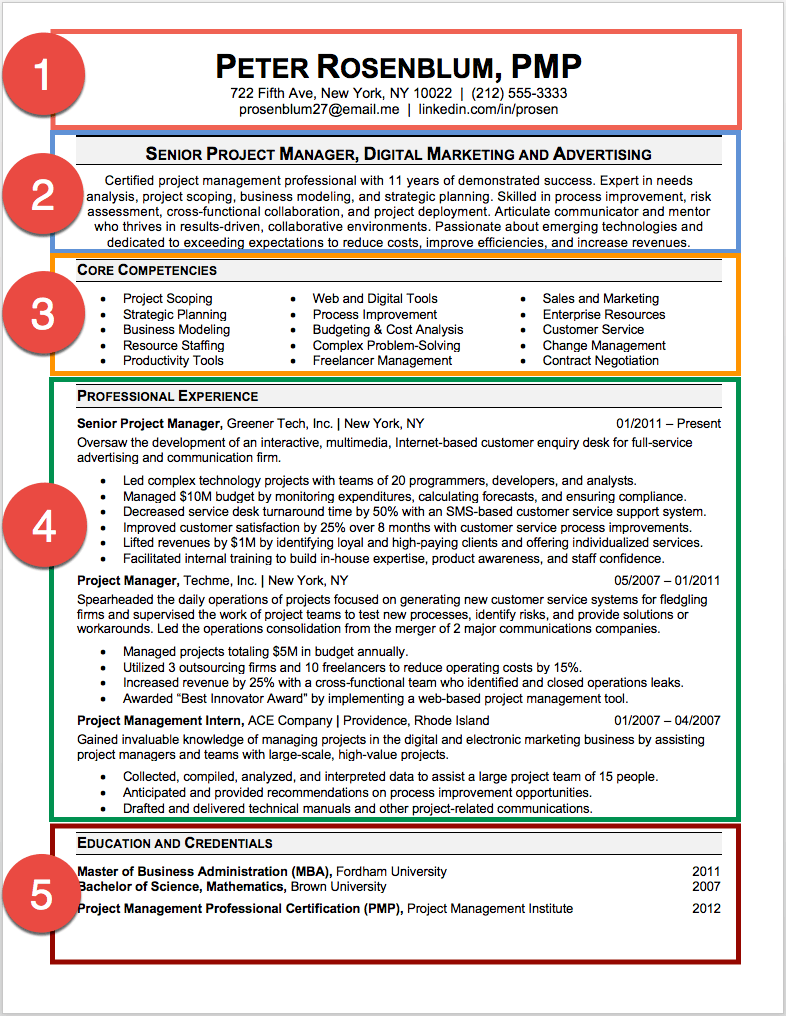Project Manager Resume Sample
When creating your own resume there are some key elements that, if you don't get them right, you simply won't land an interview... which means you won't get the job either.
Let us walk you through the process with this project manager resume sample.
Things to Keep in Mind When Writing Your Project Manager Resume
Your resume is the single most important tool in your job search toolbox. It will be required in 98% of situations and needs to stand on its own to communicate the value you bring as a project manager to any employer.
Overall, your project manager resume needs to be:
- Well organized and utilize proper white space to make it easy to visually scan and find what the reader is looking for.
- Flawless in terms of spelling and grammar.
- A summary of your accomplishments stated in quantifiable results.
- 2 pages (max). The only exceptions would be academia or federal government resumes.
With these basic tenets in mind, let's move into the details of each section of your project manager resume. (We included full-size version of the project resume sample for your review.)
And, if you decide you would like professional resume writing help, you can check our our project manager resume writing packages.

Section 1: Your Contact Information
If the end game is for someone to contact you, you'll want to make sure that you make it easy for them. Here you will include everything a hiring manager or recruiter would need to find you: email, phone and LinkedIn.

Every bit of vital contact information is clearly stated right up front. And none of the fluff is included such as non-professional social media accounts or extraneous email addresses. The lesson here is that you want to avoid distractions in the contact information section.
Your home address lets employers know whether or not relocation will be required. So, if you are moving cities, you will want to include your new address here. Also, with the portability of phone numbers (especially cellular numbers), often times the area code doesn't match the local area. A physical address will let an employer know where your "home base" is.
Section 2: Your Summary
Next to your contact information, your summary section is the most important part of your resume. Think of it as the introduction to the value you bring to any employer. Notice this is not an "objective" section because your objectives are not the concern of employers. They have need for a talented project management professional and they are trying to quickly evaluate whether or not to go to the next step with you.

Here you will clearly state your title and your industry specialty. This section title isn't about the jobs you've held as much as the job you want. If you are looking to move up, you might consider using the title that you are aiming for. Mentioning your industry specialty is important because it lets employers know that you won't have a learning curve in terms of industry terminology or industry-specific issues.
Section 3: Core Competencies
If you understand the hiring process today, then you understand the importance of applicant tracking systems or ATS. ATS software applications sort through thousands of resumes to find candidates that fit the job description. Applicant tracking software enables employers to save time, keep the recruiting process organized and save paper.
Applicant tracking systems are similar to recruiters (corporate and executive) in that they both look for key information to make the filtering decision. While recruiters look for grammar or spelling errors, or critical skills that are missing, applicant tracking system automated decisions are driven by the keywords found in (or missing from) your resume.

How can you tilt the ATS results to your advantage?
It is quite simple, if your project manager resume contains the target keywords the employer is looking for, you will survive the ATS filter. So, you will need to research the job descriptions for the positions you are interested in and then include the related keywords in your resume.
As a bonus, most companies don't just burn your resume after a position is filled. Long after a position is filled, employers search their ATS database to find matching candidates for new positions. Now, that's a great long term benefit of getting your resume right!
So, use the core competencies section to feed the relevant keywords to the ATS systems used by hiring firms. Study the job descriptions (plural) to find common skills and qualifications that are shared between these positions. When these match your own skills and experience, use those keyword phrases in this section.
Section 4: Professional Experience
The professional experience section is where you communicate both what you know and what you've accomplished.
You want to avoid huge paragraphs narrating everything you've done over the past 2 decades. You don't need to communicate your life's story here. Stick to the most recent and relevant experience. Further details can wait for the interview (only if they are relevant, of course).
Describe and quantify your most important achievements; those things that are going to make a hiring manager stand up and take notice. This is where you demonstrate that you can handle challenges and produce results.

Cover your work experience by starting with your title, the company name, location and dates of employment.
Then, provide 1 to 2 sentences that describe the company (if a smaller firm) or the division (if a large, well-known firm). This is where you set the context of your project management experience.
Next, use bullet points to describe what you did and how well you did it.
Employers are reading these bullet points with their talent needs in mind. They want to see that you can do similar work and that you understand the value of the work you are doing. That's why quantifying the results is so important.
- Did you save the firm tens or hundreds of thousands of dollars? Then provide those numbers.
- Were the process improvements you put in place with your team able to reduce lead times? By how many days, weeks or months?
- Did revenue increase as a result of a project you managed? How much? Add both the dollars and percentage if possible (assuming your firm is okay with that information being shared, of course).
You get the point, right? (Pun intended.)
Keep is short and sweet. Include the most relevant experience. Get right to the accomplishment and put in perspective for the hiring manager reading it.
Section 5: Education and Project Management Certifications
This section should be short and to the point. For education, simply identify where you went to school. If it was in the last 15 years, then it is okay to include the graduation date. If longer than that, you might consider leaving the date off. You don't want anyone to unconsciously think that you've passed your prime (and, yes, it would illegal for them to do that consciously). So, saying you graduated 30 years ago isn't helpful.
What about your grade point average or GPA?
Here's the reality after the first few years out of college, your GPA no longer matters. Which is good news for some and, for others who really want to keep "the college years" alive, not so good news.
Yes, your GPA is a reflection of your achievements... but much more relevant now is what you've accomplished in the real world. That's what employers really want to know.

As far as credentials and project management certification, you definitely want to point those out here. If you've received your certification, such as Project Management Professional (PMP), Program Management Professional (PgMP), or Portfolio Management Professional (PfMP) from the Project Management Institute, most hiring managers will recognize that right away and will not need further clarification.
If, however, you've taken project management courses at your local university and received a certificate, then you may want to provide a one sentence description of that program.
Putting It All Together
If you've followed the formula above, you are well on your way to your first interview. Before sending out your resume, take a step back and review it one more time (better yet, have a friend or professional colleague review it... a fresh pair of eyes, so to speak).
For your reference, here is our project manager resume sample all on one page...

To help guide your final review, ask yourself these questions:
- Did you use strong, action-based language throughout?
- Were you consistent with the tense?
- Did you use proper grammar from top to bottom?
- Are there area where you could cut out words to make things simpler and easier to understand?
- What bullet points still include unquantified activity? Can you add some numbers to those?
Finally, the BIG question... does your project manager resume tell your story, clearly and concisely?
If the answer is an unqualified "Yes!" then you should be good to go.
If not, then perhaps now would be a good time to reach out for some professional help.
